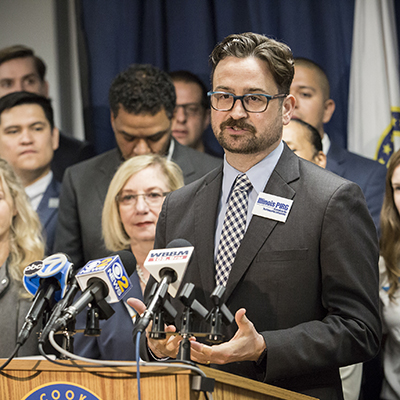
Consumer Lettter Opposing ComEd’s Demand Rate Proposal
Today, we joined AARP Illinois and five other consumer and anti-poverty groups in a letter to legislators asking them to reject a ComEd's proposed radical change in how consumers are charged for energy. The letter is below.
Today, we joined AARP Illinois and five other consumer and anti-poverty groups in a letter to legislators asking them to reject a ComEd’s proposed radical change in how consumers are charged for energy. The letter is below.
Dear Member of the General Assembly,
The undersigned organizations have serious concerns with the mandatory shift of all residential consumers to “demand charges” as Commonwealth Edison has proposed in draft legislation. This proposal is a radical change in how every residential consumer pays for energy, making bills confusing and rendering customers less able to manage their energy costs.
Demand Rates are confusing to consumers and can cause large increases in consumer bills. Traditionally, a residential customer’s bill reflects primarily how much energy is used over a month. The more a customer consumes over a month, the higher their bill will be. This is simple to understand and encourages energy efficiency.
Demand charges measure the maximum kilowatt of use (or demand) during a period of time, usually 15, 30, or 60 minute intervals. A demand charge means customers must monitor their usage in smaller intervals, such as every 30 minutes. Turning on a dryer, a toaster, or a hair dryer at the wrong time can make your bill significantly higher. Because demand charges are complicated and hard to understand, they act similar to a fixed charge, which a customer cannot reduce. No recent studies exist to determine how customers’ behavior may change with a demand charge.
For many of our members, energy affordability is a serious and pressing concern. Under this proposal, individual customers could experience dramatic increases in their bills simply as a result of when they chose to use an appliance. If this customer is low income, one expensive and unexpected utility bill can quickly turn into a financial crisis.
The legislature is not the appropriate forum to consider a radical shift in how consumers pay for electricity. ComEd’s proposal has not been tested, and its impacts are unknown. No state legislature has ever approved a demand charge on all residential customers, nor has a public utility commission approved demand charges on all residential customers for any investor owned utility.
We oppose a mandatory shift of all residential consumers to a demand charge, regardless of the forum. However, if ComEd wishes to pursue their proposal, it should undergo the kind of scrutiny that regulatory agencies like the Illinois Commerce Commission and its professional staff are designed to perform in a public process that is open for the participation of our organizations and others. Consumers deserve and have a right to this thorough review.
For these reasons and more, we ask you to reject ComEd’s proposal.
Sincerely,
Julie Vahlling
Associate State Director
AARP Illinois
Joshua M. Collins
Legislative Director
Citizen Action Illinois
Lucy Mullany
Senior Project Manager
Heartland Alliance for Human Needs & Human Rights
Jody Blaylock
Policy Associate
Illinois Asset Building Group
Abraham Scarr
Director
Illinois Public Interest Research Group
John Bouman
President
Sargent Shriver National Center on Poverty Law
Dory Rand
President
Woodstock Institute
Authors
Abe Scarr
State Director, Illinois PIRG; Energy and Utilities Program Director, PIRG
Abe Scarr is the director of Illinois PIRG and is the PIRG Energy and Utilities Program Director. He is a lead advocate in the Illinois Capitol and in the media for stronger consumer protections, utility accountability, and good government. In 2017, Abe led a coalition to pass legislation to implement automatic voter registration in Illinois, winning unanimous support in the Illinois General Assembly for the bill. He has co-authored multiple in-depth reports on Illinois utility policy and leads coalition campaigns to reform the Peoples Gas pipe replacement program. As PIRG's Energy and Utilities Program Director, Abe supports PIRG energy and utility campaigns across the country and leads the national Gas Stoves coalition. He also serves as a board member for the Consumer Federation of America. Abe lives in Chicago, where he enjoys biking, cooking and tending his garden.
